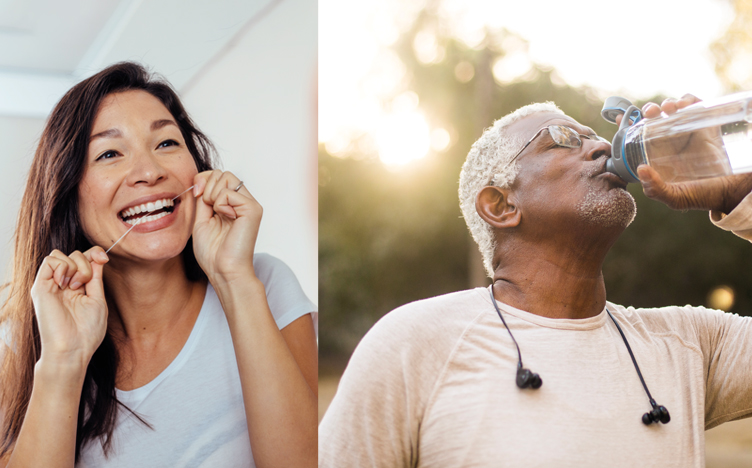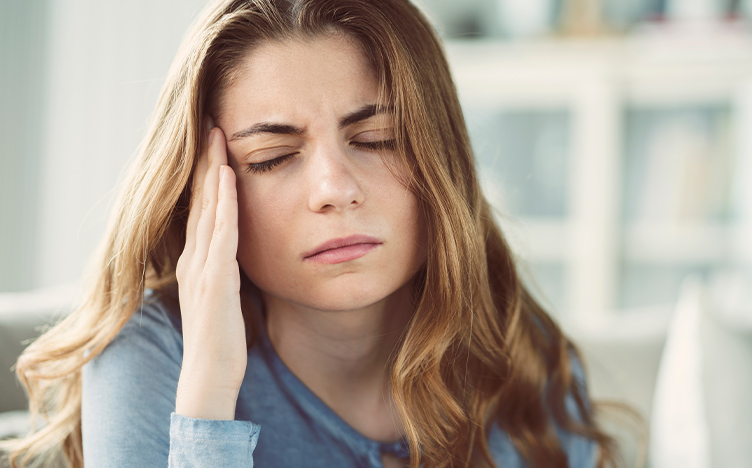When it comes to your oral health, your job is a minefield. Stress, snacking, even happy hour, can all put your teeth and gums at risk. Here are some of the major risks to look out for and some tips for minimizing the toll work takes on your mouth.
Is your job killing your smile?
How work can affect your oral health
Succumbing to snacks
Sure, those bowls of candy and snacks on everyone’s desk are tempting. And if you’re working from home, you’re probably never more than a few steps away from a cupboard full of sugary goodies. Snacks are hard to resist. But resist you should, because sugary or starchy snacks are tough on your teeth. Here are some of the main offenders:
• Treats that stick to your teeth, such as chewy candies, caramels and dried fruit, make it difficult for your saliva to wash away harmful sugars.
• The starches in snacks like chips break down into the simple sugars that plaque bacteria feeds on, which produces damaging acids.
• Caffeinated beverages can reduce the saliva flow your mouth, which can lead to tooth decay and gum disease.
Healthy smile tips:
• Try to eat snacks during mealtime. Your saliva increases while you eat a meal, which helps wash away food particles and harmful sugars, and reduces the effects of acids.
• If you just can’t resist the urge for a little something extra throughout the day, make smile-friendly choices such as fresh fruits, veggies or nuts. Plain, unsweetened yogurt and cheese contain calcium, phosphates and vitamin D, which are important for strong teeth.
• For your caffeine boost, consider unsweetened green and black teas, which contain compounds that suppress harmful bacteria.
• Drink plenty of water. Water rinses away harmful sugars, starches and acids, helps combat dry mouth and may provide a dose of protective fluoride.
Stressing out
Projects, quotas, delivery deadlines — not to mention the anxiety and uncertainty the COVID-19 pandemic has caused — means that work can definitely be a source of some major stress in your life. Not surprisingly, job stress can cause you to indulge in some unhealthy habits, such as teeth grinding, jaw clenching, nail biting, chewing on pens and pencils or binge snacking, all of which can lead to tooth damage, gum disease and canker sores.
Healthy smile tip: Relax! The American Psychological Association offers some helpful tips for reducing your work-related stress and maintaining a healthy work-life balance.
• Get some exercise. Instead of using your lunch break to plow through a basket of fries, eat a quick, healthy lunch and use the remaining time to get in some physical activity. Go for a jog or walk, do some yoga or take part in any physical activity you enjoy. Look online for free workout videos; many sites offer comprehensive workout routines that require 30 minutes or less.
• Have some fun. If you can’t work out, or it’s just not your thing, find something else to do. Indulge in a hobby, read a chapter of a novel, play a board game with your kids — the options are limitless.
• Learn some relaxation techniques. Meditation and deep-breathing exercise are two effective techniques for turning off and calming down. If nothing else, take a few quick breaks during the day to give yourself a mental timeout from work.
• Get some sleep! A good night’s rest is crucial for your physical and mental well-being. Be sure to get the recommended amount of sleep for your age. To ensure you can fall asleep, avoid caffeine and alcohol for several hours before your bedtime. And if you like to watch TV or scroll through your Twitter feed in bed, stop. Minimizing stimulating activities before bed will help you fall asleep more quickly.
For many of us, the coronavirus outbreak has added another level of stress to our work lives. To help you cope, the Centers for Disease Control and Prevention (CDC) has provided some tips for coping with work stress and managing fatigue related to the pandemic.
Taking a smoke break
While this probably isn’t news to anyone, tobacco products, such as cigarettes, cigars, and chewing tobacco, are bad for your oral health. Smoking and chewing tobacco can lead to discolored teeth, bad breath, tooth loss and an increased risk of oral cancer. And while it doesn’t involve tobacco, the vapor from e-cigarettes contains nicotine — which can lead to gum disease and tooth loss — along with other chemicals that can harm your teeth.
Healthy smile tip: If you use tobacco products or vape, stop. Both the American Cancer Society and the CDC offer free resources to help you quit. Your employer might also offer resources to help you fight your nicotine cravings.
Waiting to treat dental injuries
It’s happened to many of us. You’re snacking during work or at lunch with coworkers when you feel that “uh-oh” crunch. Maybe it was a hard candy, maybe it was an ice cube, maybe it was the pit you missed inside that cherry, but you look in the mirror and, sure enough, you chipped or cracked a tooth.
But you have a meeting in an hour. Or a project due at the end of the day. It’ll be OK to wait a few days to see the dentist, right? Wrong. If you suffer a dental injury, time is of the essence.
Healthy smile tip: If you crack a tooth, the American Dental Association recommends that you see a dentist as soon as possible. Treat the injury by immediately rinsing your mouth with warm water to clean the area. You can also put cold compresses on your face to reduce any swelling.
The treatment will depend on the severity of the injury. For a chipped tooth, the treatment may involve smoothing the area of a small chip, or reattaching the broken piece of tooth enamel, or bonding in a filling or crown for a large chip. For a cracked tooth, the treatment can range from nothing for a small, surface crack to a root canal or extraction for a severely cracked tooth.
Regardless of the injury, your outcome will be better the sooner you visit your dentist — the meeting can wait.
Attending happy hour
While it might be great for helping you relax after a hard workday, alcohol isn’t terrific for your teeth. It’s been linked to oral cancer, gum disease, tooth decay and dry mouth. Plus, some alcoholic drinks are high in sugar and citric acids, which can irritate mouth sores, damage your tooth enamel and make your teeth more susceptible to cavities.
Healthy smile tip: Find another way to make the hour happy. Hitting a bar or raiding your fridge for a beer isn’t the only way to blow off steam at the end of the week. If time and weather permits, you can go for a run or bike ride. If you’re a social butterfly, plan a videoconference with friends to chat and enjoy some healthy snacks.
If the lure of the lounge is too strong to resist, consider a non-alcoholic cocktail or sparkling water. If you do drink alcohol, follow your drink with a glass of water to rinse away any sugars or acids. And finally, remember that it’s happy hour — always drink in moderation.
Posture tips for preserving your oral health
Avoid bad habits that can affect the alignment of your bite.
A green oral health routine?
A few simple changes in your routine can improve your oral health and help to protect the environment.
What caused this mysterious pain?
She thought it was an ordinary dental issue. The truth would be much more complicated.













